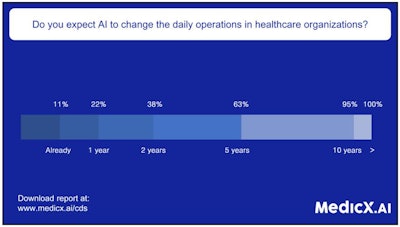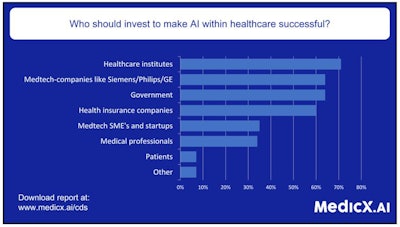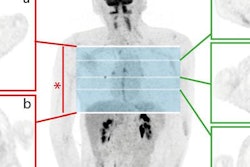
The findings of a Dutch survey confirm that medical professionals expect massive changes to practice driven by artificial intelligence (AI) in the near future. This attitude bodes well for future AI implementation, but much more needs to be done to bridge the gap between promising research and clinical integration, the authors say.
"It isn't a monster that will get out of control and will gobble up everyone's jobs. AI can, however, impact workflow and change jobs as they are now," lead author Kicky van Leeuwen from MedicX.AI told AuntMinnieEurope.com. "The survey was exciting because it showed real positivity about AI engagement among clinicians and other professionals, and it also showed some of the areas where awareness events and knowledge-sharing can make a difference."
 Support AI adoption processes with more knowledge-sharing events, urges Kicky van Leeuwen.
Support AI adoption processes with more knowledge-sharing events, urges Kicky van Leeuwen.Further, she urges doctors to do the following:
- Accept failure in low-risk use cases
- Start AI adoption slowly
- Look positively at any cost-efficiency savings
The survey was conducted between autumn 2018 and spring 2019 by MedicX.AI in collaboration with University Medical Center Groningen (UMCG) and the Technical Medical (TechMed) Centre of the University of Twente. It targeted healthcare staff and related professionals at 50 healthcare centers across the Netherlands. A total of 150 individuals responded to the survey, which consisted of 20 AI-themed questions in Dutch, both multiple choice and open questions, with some dedicated questions aimed at clinical and technical staff.
Of the individuals surveyed, 50% were clinicians and 50% were data scientists, researchers, managers, and IT professionals working within healthcare-providing institutes.
Ready workforce
The results revealed that nearly two-thirds (63%) of those surveyed thought practice would change over the next five years as a result of AI take-up. Additionally, more than 95% expected changes to practice over the next 10 years, and 11% stated that AI had already changed their working practice. A total of 85% said they were prepared to work with AI themselves, while around 50% of individuals said their organizations lacked a clear vision for AI implementation.
Around 90% of respondents saw barriers to development, with a lack of expertise (more than 45%), limitations of IT infrastructure, and data accessibility cited as the main reasons.
The survey also showed that clinicians at specialist tertiary centers, universities, and highly specialized hospitals were more open to AI. Those at secondary centers were warier of adoption and more fearful for their jobs, most likely due to less exposure to AI for research purposes, according to van Leeuwen.
 All images courtesy of MedicX.AI, UMCG, and TechMed Centre.
All images courtesy of MedicX.AI, UMCG, and TechMed Centre.
Knowing about barriers means that hospitals can establish strategies to overcome them. The main barrier is a lack of expertise, and with this comes fear, she noted. The solution is to increase awareness and factual knowledge of what AI can -- and can't -- do.
Van Leeuwen suggested that awareness events could be helpful in the current climate, giving data scientists and IT professionals the chance to understand how AI fits into the clinical processes, and allowing clinicians and managers to discover the full potential of existing data. Early this month, MedicX.AI and partners organized such an event -- "AI in hospital care" -- which attracted 130 clinical, data science, and technology participants and was hosted by the Netherlands Cancer Institute.
MedicX.AI also plans to conduct the survey every two years to provide an accurate reflection of current attitudes and, by virtue of this, a reflection of concrete adoption rates. This way both healthcare institutes and AI-software companies can adapt their own working methods in line with need.
Hybrid medics
Positioned between engineers and doctors, technical physicians who are trained in both fields are playing a pivotal role in AI take-up. This Netherlands-specific specialist can be found in AI companies and in hospitals working alongside radiologists and patients. Technical physicians actively research how algorithms affect diagnosis and workflow, help doctors optimize AI use, and hone hospital strategies as departments adopt new technology.
"Algorithms will only help save money if used optimally and if we adapt our processes properly," van Leeuwen noted. "Technology has been shown to usually increase costs instead of reduce them, as we all want a Porsche but drive it as an Opel. Proper selection of use cases for AI and good integration are crucial. There is no point in simply using AI as an 'extra.' "
Dedicated AI units within radiology departments can help hospitals with this integration process, she continued. In these image labs, technical physicians and other staff such as radiographers can, for example, use algorithms during the preprocessing phase to make the radiologist's analysis easier.
Go slow
"Radiologists seem to think that algorithms need to be perfect before they are used anywhere. They should lower their expectations, particularly at the beginning," she urged, adding that using AI is risky, and it is better to fail in preprocessing tasks, logistics, and checkable use cases than in full diagnosis cases. Radiologists should also look positively at any cost-efficiencies made through AI in these areas.
"Imaging departments should start adoption slowly and in areas that may not directly impact patient care, and they should be prepared to fail," van Leeuwen said. "As they get a better grasp of AI and understand where and how it might go wrong, they could start applying it to other riskier clinical fields."
In October, she will join the radiology department of the Radboud University Medical Center in Nijmegen to follow its AI acquisition and implementation process and study the effects on workflow and cost-efficiency.



















